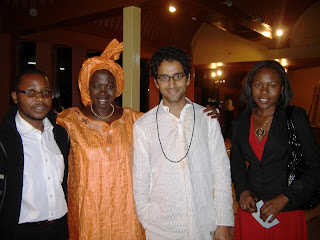Write Talk: A chat with Ken Bugul

Celebrated Senegalese writer Ken Bugul (Marietou Mbaye) talks on a lifetime in writing.
On talking to celebrated Senegalese writer Ken Bugul, whose real name is Marietou Mbaye, a few things about Malawian writing come out clear, in comparison to what is going on in other African countries. The writing art cannot move an inch if the government doesn’t put it as part of its development agenda, neither can writing advance if the private sector does not see the gold that is buried in the dust of the writing art and if writers’ groups are dormant organisations, there is no hope for the country.
As I talked to her in the gardens of the Chez Maky in Blantyre, I was still reading Vera Chirwa’s Fearless Fighter and my hands were itching for The Jive Talker by Samson Kambalu, two recent Malawian autobiographies that are receiving high acclaim on the international literary parlour.
Mbaye’s words ring true in my mind when I think of these two books, published internationally.
"Malawi has good potential when it comes to writing. The Malawi history has many things to be put in books. One doesn’t need to break their imagination to come up with a book that recounts history in an interesting way. And, look at the beauty and landscape of the land, great poetry can come from all this," she says and spreads her arms.
As she spoke, my mind wondered how the gaps in Malawi history were filled on reading Vera Chirwa’s recount of her 12 years on death row in the book. I had always wanted to lay my hands on the book because my interest was aroused by the many reviews about it that I was reading on the Internet.
As far as Mbaye is concerned, arousing the readers’ attention before they get their hands on published works is the first step towards the writers’ success.
"One must activate the curiosity of the reader. Reading is a form of consumption and readers want to get their hands on books that are much talked about. You are not a writer if your books are just in cartons and boxes," offers the writer, acclaimed for her novels Le Baobab Fou (The Abandoned Baobab), Riwan ou le Chemin de Sable (which is translated as Traces) and Le Piece d’Or (The Golden Piece).
Nonetheless, she believes that writers bringing out the good books is not enough. The private sector must play a role, she says, as publishing is ‘big business’ if mechanisms are in place. Most of all, political will is needed.
"We are lucky in Senegal because our first president Leopold Sedar Senghor was a writer. He provided the basis for writing to develop."
Senegalese presidents after Senghor don’t want to demolish the foundation he set. For one, Senghor paid for an apartment where writers meet and discuss writing.
"Without others criticising your work, you can’t develop. When famous writer Birago Diop died, his house has been used as a retreat for writers and many young people are enthusiastic about writing. They have an idol, Senghor," says Mbaye.
Here, again, my mind wades from the interview and I think about Malawian presidents and their efforts to develop Malawian writing. I think of the first president, Dr Kamuzu Banda, who was not so fond of the Malawian writer. He jailed Jack Mapanje because in between his Of Chameleon and Gods poetry he saw dissent. He sent Sam Mpasu to jail because his fictitious Nobody’s Friend was taken as a direct attack on his rule. The list goes on and one cannot think of how many books he banned.
Although Dr Banda was revered as an avid reader, who often times discussed ancient Roman and Greek literature in his speeches, he did little to promote writing.
Bakili Muluzi became the first Malawi president to join a writers’ grouping, the Malawi Writers’ Union (Mawu). He published his own book, Democracy with a Prize. But apart from that little is known about what he did, apart from making promises he never fulfilled to Mawu and making literature an optional subject for secondary school students.
The incumbent, Bingu wa Mutharika, is also a Mawu member and is a published author. He had a thumbs up when in 2006/2007 budget he allocated money to various arts associations, including Mawu and the Book Publishers Association of Malawi (BPAM). But that was all. The next thing we heard from the president on writing was when he secretly met the Mawu executive at the Sanjika Palace, where he promised writers’ workshops at the State House and a printing press, among others.
Mbaye thinks writers associations must push the executive for their role in developing writing:
"When promises are made, writers must push for them to be fulfilled. Writers must be united to make their leaders understand that writing is an integral part of development. African governments can do well if they bought a certain consignment of literary works published in their countries and distribute them in schools."
Mbaye took up the pen name Ken Bugul, which means the unwanted one in her native Wolof language. She seats among great contemporary African writers of French expression. Apart from writing, she is also a women’s rights activist.
As the interview draws to a close, I can’t wait to reread my favourite chapter of her Riwan ou le Chemin de Sable, the book where she narrates of a woman who becomes one of her husband’s 28 wives....



Comments